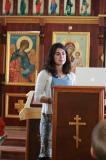Israel threatens to cut Church of the Resurrection's water

Tel Aviv ( AsiaNews ) – The Churches of Jerusalem are perplexed and concerned by the municipal authorities threat to cut off water supplies to the basilica of the Holy Sepulchre. Since water supplies were first operational in the area, successive governments have always provided access to the Holy Sepulchre free of charge as a public service to the pilgrims and act of courtesy to the religious, Catholic and non-Catholic, who custody the sanctuary. So did the British government in the Holy Land (1917-1948), the Jordanian (1948-1967) and so far the Israelis. But now Israeli municipal authorities have stepped up pressure and threats to cut off water supplies unless a tax is paid, not only in future but also for all water supplied since 1967 . The revelations were made to AsiaNews by sources in the Basilica, who prefer not to be identified in the hope that the city authorities will have a change of heart. The curious fact is that the payment requests are directed to a nonexistent ent...




























